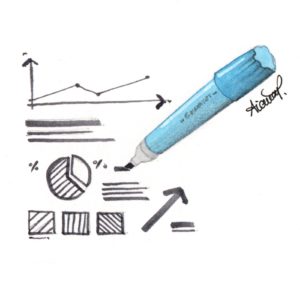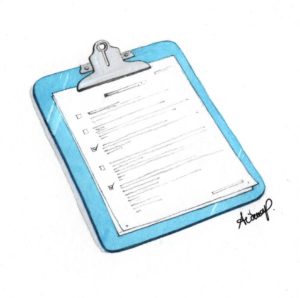Common preposition errors don’t escape a skilled proofreader’s eye. While there are rules that govern it, English preposition usage is often idiomatic. So, even if some expressions sound illogical (like center around), they may be correct. Here are some preposition examples inspired by the texts I’ve proofread. Learning more about these preposition errors and non-errors can help you make the right choice when writing a text that needs to be accurate. Read More
Writing a journal paper takes more time than doing the actual research—I’ve heard this complaint not only from PhD students but also from experienced research scientists. Why does it take so long to write a research paper?
Obvious reasons include procrastinating, having poor academic writing skills, and not knowing how to develop an outline. However, as a freelance editor who has worked with hundreds of authors, I know there are other reasons writing a journal paper takes longer than it has to. Here are some of the main reasons I have identified. I hope reading this post will help you understand how you could write a research paper faster. Read More
“Writing is my way to keep falling in love with science.”— Katharina Vestre
In The Making of You, the author’s talent for storytelling coupled with a scientist’s eye for detail makes readers turn page after page, while the fresh, clean, and lean writing style appeals to everyone. To discover the secret of Katharina Vestre’s writing process, I decided to interview her.
You started writing your first nonfiction book, The Making of You, in 2015, when you were an undergraduate. It’s unusual for students to spend their summer breaks working on a book. Apart from your genuine interest in the subject, what made you decide to write a pop science book? Read More
 “About 10 percent enjoy writing; the other 90 percent consider it a necessary chore”, says David R. Lindsay in Scientific Writing = Thinking in Words.
“About 10 percent enjoy writing; the other 90 percent consider it a necessary chore”, says David R. Lindsay in Scientific Writing = Thinking in Words.
Writing geoscience papers becomes less of a chore if you have access to all the resources you need. Having to pause in the middle of a sentence to look up whether a term is hyphenated or check the capitalization of a geological unit can slow you down. And being unsure about what to include in an illustration can set you back days or weeks.
To help you speed up the process of writing and editing geology manuscripts, in this article I will discuss several resources for earth scientists and editors. Read More
Some errors tend to wind up in the manuscript ready for submission—unless they surface during a professional editing or proofreading pit stop. Here are a few examples of common errors in nonfiction documents that a professional proofreader will not miss if the author has left them in their document. Read More
 Up until the end of my doctoral studies, I’d been a procrastinator. Completing an abstract for a conference would take me a week, drafting a literature review, a month. I liked writing but couldn’t focus on it when I had a deadline to meet. Any writing task was too much for me to handle in an efficient manner.
Up until the end of my doctoral studies, I’d been a procrastinator. Completing an abstract for a conference would take me a week, drafting a literature review, a month. I liked writing but couldn’t focus on it when I had a deadline to meet. Any writing task was too much for me to handle in an efficient manner.
But writing my PhD thesis had to be different, I told myself when I could finally see the finish line. I couldn’t afford to procrastinate. My PhD scholarship was about to expire, I didn’t have the money for a prolonged stay in the UK, and I didn’t want to be on the island anymore. So, I decided I would leave Cardiff in three months, bought a one-way ticket back home, and then opened the folder “PhD stuff” on my laptop. It was thesis o’clock. Read More
When my clients ask me when they should use scare quotes in formal writing, I usually tell them to use scare quotes sparingly and only when they have no other choice. The following is a slightly longer answer. Read More
Et al. is a commonly used Latin abbreviation in scholarly writing, so most academics know what it means. If you don’t, a dictionary will give you the explanation.
But whether et al. is singular or plural is not always clear, even to experienced writers. An author may use a singular verb after et el.; another author may use a plural verb after et al. Are they both correct, or who is wrong and who is right? To help you understand how to use et al. in a sentence so it’s grammatically correct, let’s look at a few examples. Read More
If publishing economics papers in top economics journals is your goal, you need excellent writing skills, because the economics literature has high standards. So, you need to learn how to write economics research papers that present your results clearly and use flawless language. The following tips from economics researchers, writers, editors, reviewers, and faculty will help you write better economics articles for scholarly journals. Read More
An example of a PhD dissertation to book metamorphosis that became a New York Times bestseller is Everybody Lies: Big Data, New Data, and What the Internet Can Tell Us About Who We Really Are. Thanks to the traveler who left a copy of this book in a hotel in Corvara, Italy, because it inspired me to write this article on PhD-based books.
Why get your PhD published as a book? For many reasons. You may want to make the most of the effort you’ve put in during your doctorate. Or your breakthrough discovery must reach a wider audience. No matter your motivation, write it down. It will serve you as a reminder later, when revising your manuscript gets tough.
Let’s discover what it takes to turn a PhD thesis into a book so that you know what to expect if you choose to go down this road.
Depending on your graphic design skills, perfectionism level, and available time, making scientific figures for publication could take as long as, or longer than, writing your research paper.
To save time, you might want to recycle and reuse some of the images you made for a poster or PowerPoint presentation. But tweaking them to fit the journal can be time-consuming. That’s why it’s often best to make graphics for research papers from scratch so you have publication-quality images.
Learn how to make scientific figures for publication in an effective way.
 Research proposals, business reports, articles, scholarly books—no matter what type of nonfiction document you write, you must respect the reader’s time. To do so, use the most effective way to communicate information by aiming for correctness, clarity, and concision.
Research proposals, business reports, articles, scholarly books—no matter what type of nonfiction document you write, you must respect the reader’s time. To do so, use the most effective way to communicate information by aiming for correctness, clarity, and concision.
When you edit your draft, examine your writing and see if you can spot any of the following signs you’re wasting the reader’s time. If you don’t know how to fix them or don’t have the time to do it, ask the help of a freelance editor.
Some of us were taught in school that the use of first-person personal pronouns makes scientific writing subjective. But it’s not true. Using we or I in a research paper does not always shift the spotlight away from the research. And writing in the third person or using passive voice does not make a piece of research writing objective. So, if a reviewer or thesis advisor tells you to remove all first-person references from your manuscript, know that it is not incorrect to use I or we in a paper, despite what many people believe.
So, the short answer to the question in the title is yes. It is acceptable to use we in your paper to refer to you and your co-authors. Whether you use first person pronouns or not is a writing style choice. Read More
In English, both it and they are used to refer to a company.
Example: According to the company, they (it) have (has) more than 50,000 employees.
The choice of pronoun depends on many things: context, type of written communication, house style, and more.
The common view is that in American English, company is referred to as it, whereas in British English, company is referred to as it or they, but they is more common. Read More
HTML, EU, and NATO are examples of acronyms. Merriam-Webster defines acronyms as words “formed from the initial letter or letters of each of the successive parts or major parts of a compound term”.
In some expressions, acronyms can be preceded by an indefinite article (a or an). But how do you choose the right indefinite article before acronyms?
The rule for indefinite articles before acronyms: an before vowel sound, a before consonant sound
Acronyms can be read as pronounceable words (for example, NASCAR) or as a series of letters (for example, BBC). It’s important to know how to pronounce an acronym, because the rule for choosing the right indefinite article before acronyms is based on pronunciation, not spelling. Read More
Publishing a paper, a book, or an article is hard work. When you succeed, it feels amazing. When you don’t, all you want is to put the failed project behind you and move on. But you shouldn’t. Not so fast, at least. A failed writing project is more than wasted hours and effort. It can teach you a lot.
Here are some of the most valuable lessons you can learn from a failed writing project.
Good editing is unobtrusive. A text that has been professionally edited reads seamlessly. You cannot tell where the author’s work ends and where the editor’s intervention starts, because the editor was able to emulate the author’s writing style. Read More
Mathematics is the guest star of many research papers in disciplines other than STEM. To write and edit research papers with math, you need to be familiar with equations and mathematical symbols. This article covers the basics of editing papers with math, including how to write equations in research papers and how to write and punctuate sentences with math symbols. Read More
Both center around and center on are correct.
Center on vs. center around
Writing center on is logical, and no-one will object if you use this expression. But if you use center around, some may think your writing is illogical or sloppy. Read More
If you need to follow APA Style and are wondering if all entries in your reference list must be cited in the main text, you need to first understand the difference between a reference list and a bibliography.
APA Style reference list vs. bibliography
In general, the journals that follow APA Style use reference lists, not bibliographies. So, if you’re writing an APA research paper, you most likely need to create a reference list. Reference lists and bibliographies belong to different species.
A reference list has only the works cited in the text. In contrast, a bibliography comprises not only some or all the works cited in the text but also other works not mentioned in the text. These can be sources the author consulted in the preparation of the text, works recommended for further reading, or both. Also, bibliographies may contain notes (annotated bibliographies). Read More




